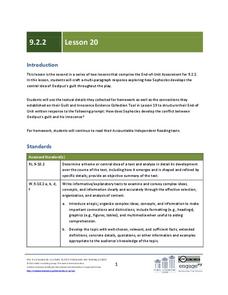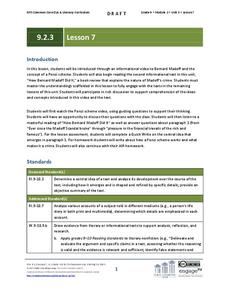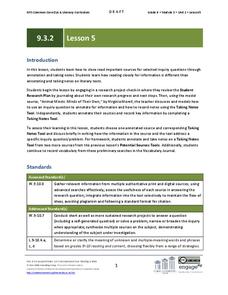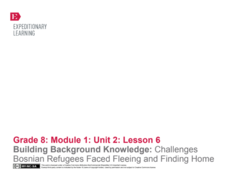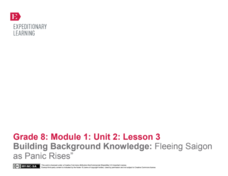Lakeshore Learning
Winter Bear Warm-Up
Don't be left out in the cold, ensure young learners are prepared for the winter weather with this clothing activity. After introducing them to different clothing items using the provided picture cards, students sing a song before...
ReadWriteThink
Literature Circles: Getting Started
Make reading more enjoyable and interactive with literature circles! Here you'll find detailed lessons to begin the literature circle process. Ten lessons introduce each role learners take on. Literature circle roles include...
EngageNY
Grade 9 ELA Module 2, Unit 2, Lesson 12
Ninth graders demonstrate their understanding of a central idea in Oedipus the King with a mid-unit writing assessment. Writers formulate a claim about the connection between prophecy and Oedipus's actions and craft an in-class essay...
EngageNY
End of Unit 2 Assessment, Part 2: Revise Essay Drafts
Time to revise! Scholars revise their argument essays based on Shakespeare's A Midsummer Night's Dream using feedback from their teacher and peers. They begin their revisions after reviewing a mini-lesson plan on proper writing conventions.
EngageNY
Grade 9 ELA Module 2, Unit 2, Lesson 13
The text structure is vitally important when crafting a rise in tension. Explore Sophocles' choice to order his events in a particular sequence with a lesson about Oedipus the King. As the light of realization dawns on the characters,...
EngageNY
Grade 9 ELA Module 2, Unit 2, Lesson 20
Oedipus' lack of literal and figurative vision does not mean he cannot see his guilt in the terrible fates of Laius, Jocasta, and all the lives touched by prophecy. Conclude a literary analysis unit on Sophocles' Oedipus the King with a...
EngageNY
Grade 9 ELA Module 2, Unit 2, Lesson 17
As Oedipus the King approaches its tragic conclusion, high schoolers discuss Oedipus' reaction to seeing his wife's body. They also examine how Sophocles structures the scene to contribute to the central idea of his play.
EngageNY
Grade 9 ELA Module 2, Unit 3, Lesson 7
After viewing an informational video that introduces Bernard Madoff and the concept of a Ponzi scheme, class members begin reading "How Bernard Madoff Did It," Liaquat Ahamed's New York Times book review that explains Madoff's crime, and...
EngageNY
Grade 9 ELA Module 3, Unit 2, Lesson 5
Once you find and evaluate your sources, it's time to discern the most helpful information. In a research lesson plan based on questions derived from Temple Grandin's Animals in Translation, practice annotation and taking notes.
EngageNY
Building Background Knowledge: Challenges Bosnian Refugees Faced Fleeing and Finding Home
What challenges did Bosnian refugees face as they fled home during the Bosnian War? Scholars read an interview with four refugees and identify common themes that connect the universal refugee experience. They also engage in a...
EngageNY
End of Unit 2 Assessment, Part Two: Final Draft of Analytical Essay
What's one way to make a good essay great? Revise! Scholars revise their drafts from a previous lesson plan to help write their final polished analytical essays about the universal refugee experience. They also practice properly citing...
EngageNY
Building Background Knowledge: "Fleeing Saigon as Panic Rises”
How can scholars better understand the refugee experience? Pupils read Fox Butterfield's article "Panic Rises in Saigon, but the Exits are Few" and connect it to the novel Inside Out & Back Again. They annotate the text, looking for...
EngageNY
Building Background Knowledge, Predicting, and Focusing on Key Vocabulary: “Refugees: Who, Where, Why”
Using the fourth of 20 lessons from the Grade 8 ELA Module 1, Unit 2 series, scholars discuss refugees' challenges when finding a place to call home. They also read and answer text-based questions about the informational passage...
EngageNY
Mid-Unit Assessment: Analyzing an Informational Text about a Refugee Experience
Refugee & Immigrant Transitions is an organization that helps newcomers adjust to life in the United States through education and community leadership opportunities. As part of a mid-unit assessment, pupils independently read a...
EngageNY
Analyzing the Content of a Model Essay: “How Ha’s Mother Is Turned ‘Inside Out’”
What are the psychological and emotional effects associated with being a refugee? Scholars consider the question by reading and analyzing an essay, "How Ha's Mother is Turned 'Inside Out.'" Once finished, they engage in a whole-class...
EngageNY
Launching Researching: Reading for Gist and Gathering Evidence Using the Research Guide
Let's get to the gist! Pupils work in research teams to gather information about specific refugee experiences from Bosnia, Afghanistan, and Kurdistan. Scholars then try to find the gist of informational texts about their topics,...
EngageNY
Mid-Unit Assessment: Getting to Know a Character: What Details in the Text Help Us Understand Ha?
Take a walk with me. Scholars participate in a gallery walk of the anchor charts their groups created about Inside Out & Back Again in the previous lesson plan. Pupils take notes about Ha's character on sticky notes as they take the...
EngageNY
Building Background Knowledge: The Impending Fall of Saigon
Scholars read "Doc-Lap at Last" and participate in a Three Threes in a Row activity in which they answer three questions about the text in their rows. They then discuss the central idea of the text. Readers finish the lesson plan with a...
EngageNY
End of Unit 2 Assessment, Part 2: Revise Essay Drafts
Positive feedback is a great way to improve writers' skills. Scholars receive their draft essays back with teacher comments and start the revision process. Next, they prepare to begin their final drafts at home.
EngageNY
Writing an Argument Essay: Planning the Essay
It's time for a quote sandwich! Using the resource, pupils learn about the three parts of an effective quotation: introduction, quote, and analysis. Scholars use the model to peer critique each others' writing to show what they learned.
EngageNY
Analyzing a Thematic Concept: Becoming Visible after Captivity
Have some dignity. Readers describe the word dignity using a word web and then sort Louie's actions into categories of reconnecting or dignity with a Visibility Double Arrow graphic organizer. They then use all of their ideas and...
EngageNY
Analyzing an Author’s Craft: Carlotta’s Journey to Justice
What's an appropriate response? Scholars open the text A Mighty Long Way to see how Carlotta responded to racism, discrimination, and abuse. They work in pairs to answer questions regarding her responses. To finish, they use the Dignity...
EngageNY
Mid-Unit Assessment: Analyzing Author’s Purpose in Speech and Text
Part one of a mid-unit assessment relating to The Omnivore’s Dilemma includes listening to and analyzing a speech by Birke Baehr. Part two involves analyzing an excerpt from the text. The assessment ends with short response questions.
Kelly's Kindergarten
March Daily Activities
There's a pot of gold at the end of the school year! Use a month's worth of reading, writing, and counting activities to keep kids learning through the month of March.







